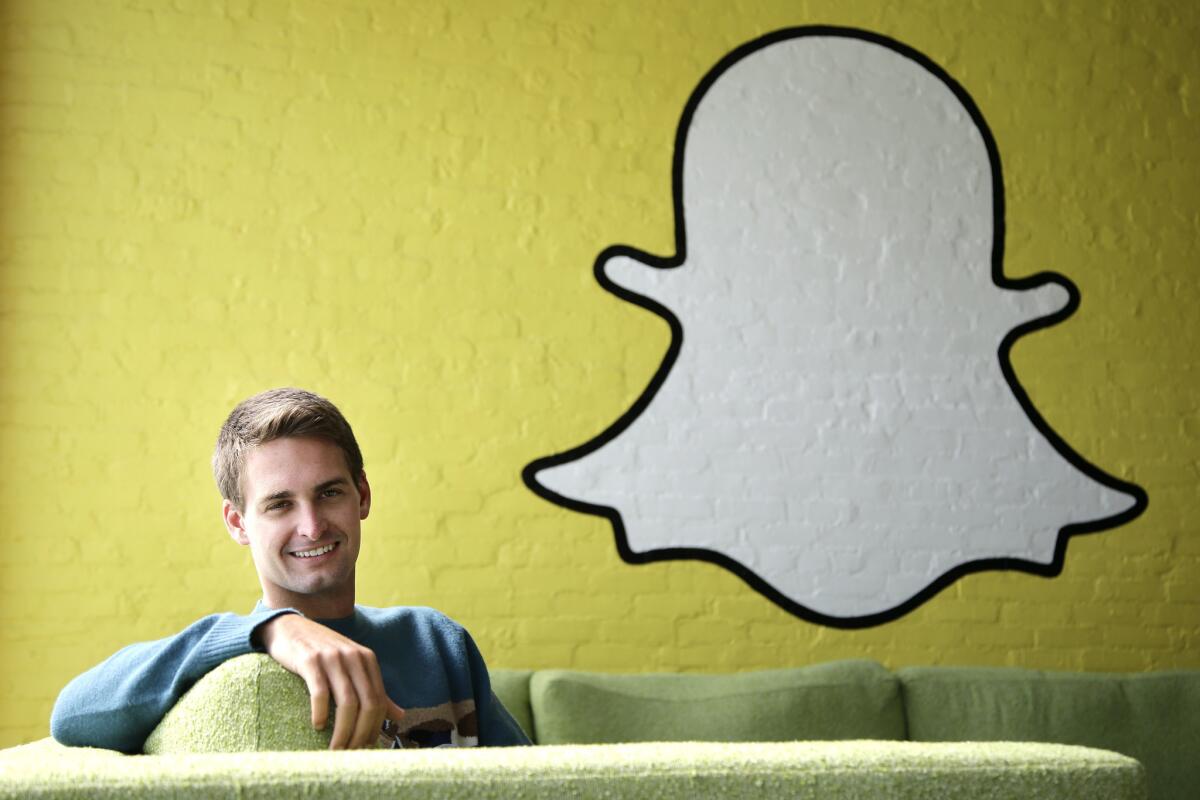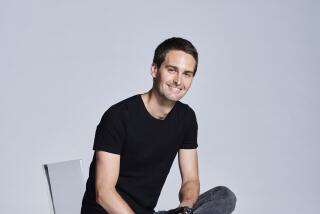Instagram and YouTube play nice with their most popular users. Why doesn’t Snapchat?
Self-described Snapchat power user Michael Platco received a neon sign bearing his name from social media rival Instagram. And a different video app emails him every week, hoping he tries their services and brings along his 500,000 Snapchat contacts.
Naturally, he’d expect Snapchat maker Snap Inc. to call — or even just respond to his emails — to ensure it doesn’t lose his videos, sponsors and fans to a competing service. Instead, the world’s fifth most popular mobile app has warned him to follow its rules and briefly deactivated his account.
“You couldn’t find a bigger advocate for Snapchat than me,” said Platco, who supports his wife and infant son with a six-figure income from companies that pay him for promotion in Snapchat posts. “I made that jump thinking Snapchat would continue to let me keep doing what I’m doing at least … but they are making it so hard.”
Such strained relations are typical for Snap, whose aloof behavior projects an elite image but can also come off as arrogant to users, employees and business partners.
Platco and several dozen other well-known users are frustrated because Snapchat refuses to collaborate on fostering their stardom and moneymaking opportunities. Another big user, Shaun McBride, detailed the concerns in a 10-minute YouTube video this month that included written support of 10 others.
They’ve stopped short of ditching Snapchat, but say they aren’t afraid to do so. It’s tough to estimate the dent their defection would leave because the 5-year-old Venice start-up publishes limited statistics.
People who engage with the $16-billion, ad-driven company are accustomed to attitudes that range from self-confidence to pretension. There’s agreement on the likely source: Co-founder and Chief Executive Evan Spiegel, the 26-year-old Stanford University engineering dropout whose wealth could skyrocket if Snap goes public next year as expected.

Questioning the billionaire’s vision is a difficult exercise. Snap has redefined itself over six years from a sexting app that was the butt of jokes to a video-sharing powerhouse adored by media giants to a camera company eliciting chills across Silicon Valley. It hasn’t significantly botched any feature launches. And its first device, sunglasses with a video camera built into a hinge, are an early hit. Despite their business grievances, top users rave about Snapchat’s core features.
Snapchat investors including Benchmark’s Mitch Lasky say Spiegel doesn’t get enough credit for creating masterpieces.
“To contrast with Twitter, where we were also an early investor, getting product releases there was difficult,” Lasky recently said. Spiegel “on the other hand is an inventor.”
But Snap’s reliance on his creative genius has coincided with shutting out others. A culture of secrecy befuddles employees, who have been surprised by media reports about feature updates and the IPO filing. Business partners, including major media companies like Viacom and Walt Disney, find themselves accepting stiffer terms than with Facebook or Twitter. Spiegel forges ahead, including by acquiring smaller tech companies, with limited counsel of major investors.
Fans have been annoyed this month as they bear long lines to buy Spectacles, the new sunglasses exclusively available through roving vending machines open for limited hours. Snap neighbors in Venice grouse over what they describe as an unapologetic real estate expansion driving up rents and suppressing the enclave’s bohemian vibe.
Snap has, at times, budged. Needing to increase revenue in the last year, it added measurement tools and more options to appease advertisers. But some strict ad controls persist.
The tensions aren’t likely to fade as Spiegel and Chief Technology Officer Bobby Murphy are poised to maintain voting control after an IPO. That leaves influential users wondering if they’ll ever fit into Snap’s long-term strategy. The company declined to comment, but influencers remain a subject of internal discussion.
Snap intends for users to share seconds-long bursts from their lives with friends. Even celebrities, whose followers test the limits of “friends,” largely stick to showing personal behind-the-scenes views in Snap’s eyes.
But in promoting companies and creating widely watched stories that go beyond their personal experiences, Snapchat’s influencers are developing increasingly professional content. This work, they say, has shaped Snapchat into the entertainment hub it is today.
They’re the boundary-pushers whose hit videos guide advertisers and people on how to use Snapchat. By devoting entire days to the app, influencers realized that they could use its painting tools to craft intricate doodles, spawning a new art form across social media. In thinking of themselves as entertainers, they’ve defined new genres on Snapchat, like recurring skits that capture strangers’ reactions to comedic stunts.
“If many of the top influencers were to stop on Snapchat, the innovation and subcultures could go away,” said Nick Cicero, chief executive of social media marketing firm Delmondo. “They are creating amazing, rich, diverse conversations.”
Audrey Spencer, who draws 90,000 viewers a day on Snapchat, gets half from industrial design jobs and half her income from sponsors — a violation of Snapchat rules. She rejects the notion she’s not using Snapchat as intended, given the bonds formed with viewers who adore her cat drawings.
“I seek out stuff I want to share with my audience,” she said. “It’s not a half-hearted sales pitch.”
But her business could be clashing with Snap’s own. Advertisers including Coca-Cola, Pandora and Target pay influencers to promote their products in Snapchat videos. They find that viewers perceive items better if someone they know pitches it, and influencers have large, young followings.
Those deals do an end run around Snap’s own ad system and violate a ban sharpened over the last year on non-permitted commercial use of Snapchat.
The company declined to comment on enforcement. But it stands apart from Facebook and YouTube, which facilitate paid product placement, and Instagram, which is exploring ways to do so and tolerates it for now.
Snapchat influencers say advertisers should have choices. And encouraging sponsored content can pay off, they say. The company could take a cut of deals. Or it could continue to place ads alongside their videos, which could draw increased viewership and higher fees if Snap prominently displayed their content.
To increase users’ fame, some suggest a new section on the app to display popular posts the same way as Instagram has done. They say it could help them add new fans and improve relationships with sponsors. They wouldn’t mind Snapchat financing recurring shows starring them or developing features tailored to them as YouTube does. Small moves would be welcome too, like additional viewership statistics similar to what Facebook provides, or a special identity-verifying badge on their accounts reminiscent of what Snapchat gives celebrities.
I made that jump thinking Snapchat would continue to let me keep doing what I’m doing at least ... but they are making it so hard.
— Snapchat user Mike Platco, who supports his family with the app
Many top users turn to unauthorized apps to post on Snapchat because they are built to better save work or post on a schedule, saving sweat and tears. But when Snapchat’s automated systems catch someone using third-party apps, it issues warnings and temporarily locks accounts — as full-time Snapchat user Platco recently experienced. Snap says the apps are hacks that threaten user security.
The crackdown contrasts with video-streaming competitors that are spending big on white-glove service. YouTube provides fast-rising stars with training classes, a dedicated contact, cash for big-budget productions as well as space and equipment, including GoPros and 3-D camera rigs. Facebook suggests good cameras and provides guidance on following rules and ad laws. Its Instagram app walks top users through new features and frequently solicits feedback. Smaller firms including Live.me hold intimate events, like bowling night, for big users.
Jake Paul thought that’s the type of relationship he’d have with Snap after attending a company party about two years ago. Paul met Spiegel and appreciated the praise of his craft. Since? Crickets.
“You can’t buy your wife a wedding ring and hope she stays with you for 20 years,” Paul said.
When Instagram featured him as he toured Universal Studios this fall, Paul added tens of thousands of followers. Snap will lose users if it doesn’t start matching Instagram’s tactics, he warned, noting that it’s starting to pull even in terms of his income.
Paul and McBride point to Vine — the six-second video app that’s being shut down — as an extreme cautionary tale. Though Snapchat isn’t as reliant on the top 1% of users as Vine, Paul expects some luster would be lost. He was among about 20 top Vine users who stopped focusing on the app after the Twitter-owned service refused to pay each of them a $1-million premium for a guaranteed number of posts.
“I take 30 minutes to make a Snapchat, and they don’t take 30 minutes to honor them, and that’s where the disconnect is,” Paul said. “They’ve gotten to the point where — ‘We’re Snapchat. Period.’ — it could bite them.”
Snapchat hears the complaints. Twice this year, it’s highlighted users’ elaborate digital drawings to a broad audience. But creators felt shortchanged because their account names weren’t listed.
“If they support you, you stick around … you don’t jump to other platforms,” said Tristan de Burgh, a Los Angeles influencer known for making fun of college fraternity lifestyle on Snapchat.
CJ OperAmericano, 20, is the rare influencer who describes solid communication with Snap. Her talent manager introduced her to someone who answered her questions about features. But she wonders how much longer she can continue.
Snap’s Spiegel told advertisers last year that an emotional line exists between their companies and people. Blurring that line leads to content people find weird. So brands, he said, shouldn’t try to humanize themselves on social media — which is what they get from tapping influencers. Instead, Snap offers video, banner and animation ads that stick out from normal content.
“They have a very specific picture of where they want to go, and I don’t think it involves creators,” OperAmericano said. It’s too bad that Snap is set in its ideas because influencers are a major way users get the extraordinary videos they crave, she said.
Take, for example, a remake of “Jurassic Park” that a dozen big-name users produced together to post on Snapchat. Cardboard cars, museum dinosaurs and water guns made for a cheap look, but the nostalgia-inducing re-telling spawned calls from fans to take on more movies.
Platco, the power user who now fears account lockdowns, organized the affair. He had no expectations Snapchat would promote the flick like other apps might have. But he holds out some hope Snap will come around on his job. That “mplatco” sign he got from Instagram, he hasn’t assembled it. Other apps haven’t won him over.
“It would be difficult to turn away from 500,000 followers on Snapchat,” he said. “Until the day I can make that transition, Snapchat is going to have the majority of [my] attention.”
Twitter: @peard33
ALSO
The price of your Thanksgiving dinner — and where it came from
Pilot strike could delay holiday package deliveries by Amazon, DHL







